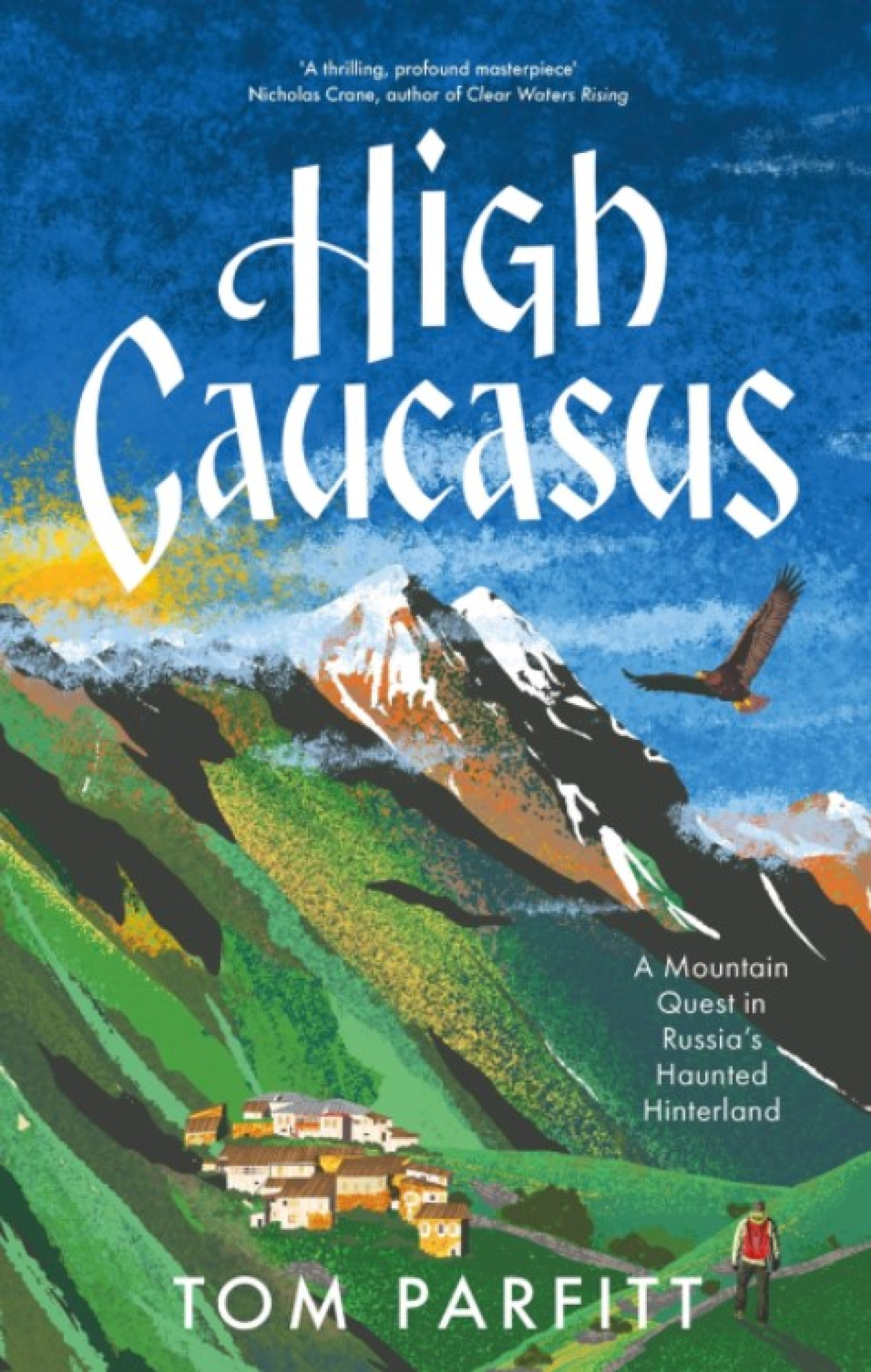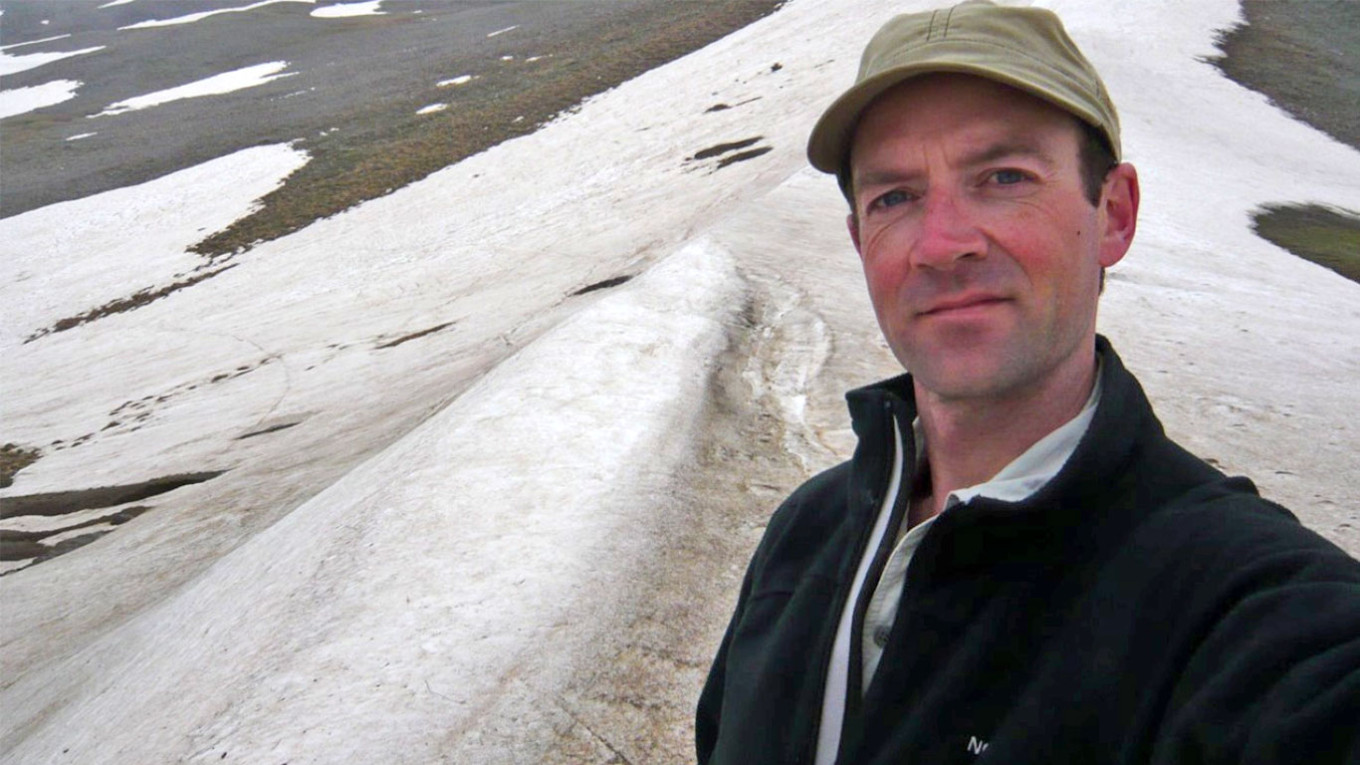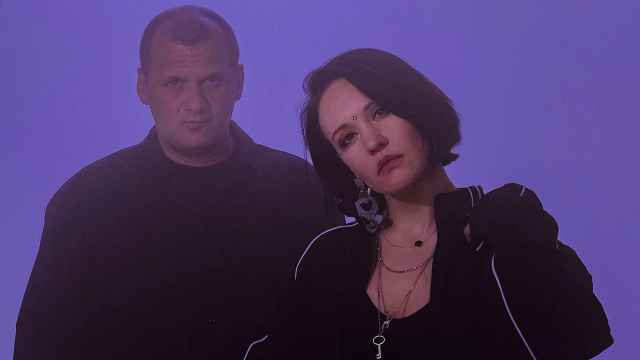Veteran journalist Tom Parfitt came up with the idea of a solo walk through Russia’s North Caucasus after reporting on the bloody Beslan school siege by Islamic militants in 2004. The undertaking was, as he puts it, his way of trying to “dilute” the memories of that horror.
The result is a poignant, beautiful and sometimes unbearably sad first-person journey through an epic landscape.
On one level, this is a traditional travelog. Parfitt’s descriptions of steppes and mountains are lyrical, and his interactions with a whole cast of characters — from shepherds and soldiers to farmers, monks and a delta-plane enthusiast — are engaging and life-affirming.
The nature of walking can mean encounters are fleeting, even superficial, but this is more than compensated by expansive Caucasian hospitality and Parfitt’s wonderful pen portraits. When, for example, three young men jump out of a truck, he writes that, “Nazim was dark and elfin in a tracksuit and baseball cap. Ruslan was plump in a sheepskin coat. Albert, a rangy youth, had a horn-handled knife hanging from his belt.”
As Parfitt strides westward, he guides the reader through a complicated web of religious fault lines and ethnic groups that begin with the quasi-independent Abkhaz on the tropical Black Sea coast and end with the Avars and Laks of Dagestan by the Caspian Sea.
Throughout, he manages to convey the physical strains and navigational challenges with a lightness of touch and self-deprecation that bely the single-mindedness required for such an endeavor.
On another level, though, “High Caucasus” is an ambitious attempt to grapple with issues far more significant than a walker’s aching limbs or chance encounters on high mountain passes. It’s an exploration of how to live with the legacy of horrific violence, brooding evil and impossible decisions made in moments of crisis.
Inevitably, the brutality inflicted by Russian forces on Chechnya during its two post-Soviet wars for independence looms large. But Parfitt also passes through the former lands of the Circassians, exterminated by the Russian Empire in the 19th century; follows in the footsteps of Dagestan-born rebel leader Imam Shamil; and talks to survivors of Stalin’s wartime deportation of entire ethnic groups. At one point, his walk is interrupted when his editors in London send him to cover the outbreak of a short-lived war in South Ossetia.
“In the North Caucasus, as in many places, everything is fine until the moment it isn’t,” he writes. “Much of the violence came in spasms, cordoned off or conducted in darkness, short and quickly curtailed. In between, people went to work and raised families and did their shopping, just as they did anywhere else in Russia.”
In addition to using his solo traveling to try and understand — and perhaps come to terms with — the consequences of conflict, Parfitt draws on two decades of reporting in Russia and his upbringing in rural England, as well as personal stories involving family, friends, relationships and parenthood.
Walking through Beslan several years after the siege in which hundreds of children were killed, he reflects on how his mother lost access to her own children from a first marriage. “It seems trivial, perhaps, to compare my mother’s experience to that of a parent whose child is kidnapped by terrorists,” Parfitt writes. “But that is the point: most of us don’t have the tools to measure such anguish. How would we behave? How much could we withstand?”
This is not to say that “High Caucasus” is a book overwhelmed by tragedy.
The themes of grief and healing seem in sync with the breath-taking landscape of forests, high passes and steppe. And Parfitt has an eye for self-effacing humor, delivering occasional laugh-out-loud moments — like when he thinks the sound of his stubble on his sleeping bag is a hungry bear, or when a frightened shepherd boy takes him for an Islamic militant.
Because Parfitt’s walk occurred over fifteen years ago, it means he is free to write with introspection and the benefit of hindsight – reminiscent of travel writer Patrick Leigh Fermor’s famous trilogy about walking through 1930s Europe that was penned decades after World War II had destroyed much of what he observed.
And, in places, it means Parfitt conjures a Russia that, amid ever-growing authoritarianism and the Ukraine war, now feels like a lost world.
It’s difficult to imagine the security services today allowing a journalist to complete such a walk – let alone a Western journalist in a sensitive border region cheerfully knocking on the doors of an FSB border guard base (as Parfitt does at one point).
Parfitt’s writing is imbued with a gentle sadness, but “High Caucasus” resists the urge to romanticize its subjects and never slips into melancholy or irrelevance.
As Russia inflicts daily death and destruction on Ukraine, Parfitt’s exploration of how to live with a history of violence and loss is achingly topical.
"High Caucasus. A Mountain Quest in Russia's Haunted Hinterland"

Deportation of the Karachays
Uchkulan lay across a bridge at the foot of the hill. There was a dirt square with no one in it save for two old men in trilbies sitting on a bench in the lee of a house. They called out a greeting. One of them introduced himself as Seypul. He was swigging from a bottle of cheap port. ‘Sit with us a while,’ he said, pouring me a drink in a plastic cup that he produced from his pocket. I took a seat on the bench; the space between it and the house was knee deep in empty port bottles. ‘We sit here every day,’ said Seypul, by way of explanation. ‘I’m a pensioner.’
We got talking about the deportations in 1943. When Seypul said he was seventy-three years old, I realized he was speaking from personal experience. ‘Come and stay the night at mine,’ he said. ‘I’ll tell you the whole story.’
It was not late in the day, and I could easily have pushed on. But these were the kind of meetings I craved, to help me peel back another layer of understanding. I accepted immediately.
On the way to Seypul’s house, we dropped in at the local shop and I bought some chocolates as a gift for his family and a bottle of port for him. ‘Maybe, um, maybe we’ll just get a second one?’ he enquired politely. ‘Of course,’ I said, and bought another.
Seypul puffed and wheezed as he led the way to his home. The roofs of the houses in his lane were crested with aluminium fret-work; his own was decorated with silhouettes of deer and eagles. Between the houses on the lane, facing onto the street, were little enclosures made from planks: for livestock, it seemed, although none was occupied. Each home had high gates with a yard behind. Two single-storey buildings stood in Seypul’s yard: one for him, his wife and his younger, unmarried son; the other for his elder son and wife. There was a barn with a hayloft, a shed with a cow inside and a garage for his old Volga car, its bonnet coated in dust.
In the kitchen sat Seypul’s wife, Asya, in the uniform of women her age: print dress and headscarf. She welcomed me but kept in the background, tending their latest grandchild, a baby boy wrapped in swaddling cloths. Two little girls, also grandchildren, flitted in and out, giggling.
Evening had come. Asya served us soup and ayran, and Seypul switched on an old television. The end of a Michael Caine movie fuzzed the screen, the actor’s Cockney strains rising occasionally above the hubbub of Russian translation. Seypul poured us glasses of the port, which tasted like alcoholic cough syrup. When the film was finished, he cleared his throat and said: ‘The Germans came in the autumn of forty-two.’ He had begun his story.
The Nazis, I knew, had invaded the Soviet Union in June 1941, and by August of the following year, they were already in the Caucasus. ‘They didn’t kill anyone, not a single Karachay,’ said Seypul. ‘They blew up the bridges when they left, but they didn’t touch us. They billeted in the school, stood their guns together and got to work. They built roads. The officers were all Germans, but a lot of the ordinary soldiers were Romanians. They had harmonicas, which they played to us children. I was seven years old.’
To some highlanders, run ragged by Communist attempts to collectivize their precious livestock, the invading force had appeared to offer a different way of life. Seypul passed a hand across his ruddy face. ‘My father was a carpenter,’ he said. ‘The Germans asked him to work for them, but Father refused. He was illiterate but he was a clever man. When an officer came looking for him, he made himself scarce for the day. He knew that Soviet power would be vengeful. He was right. When the Germans left in 1943 and the Soviets returned, they executed a lot of people. They killed an old man just for wearing a worn-out coat the Germans had given him out of pity.’ Seypul wiped his mouth. ‘Fucking bastards. An old man. For what?’
The sympathy of some Karachays towards the invading Germans had been, in Stalin’s eyes, a treachery that tainted the entire nation. In November of 1943, a cohort of troops from the NKVD secret police arrived in Uchkulan. ‘For three days, they sat around their fires at night,’ Seypul recalled. ‘A group of them came to our home. My brother was away with the Red Army, fighting in Ukraine. The troops read a letter that he had sent home, and then they checked for weapons and took the sharp knives from the cupboard. They told us we were being deported.’
Soon, the villagers were ordered out of their houses and loaded into Studebaker trucks. These were American vehicles given to the Soviet Union under the US lend-lease programme to help fight the Nazis – now deployed in this vile act of domestic tyranny. Similar scenes were playing out across the mountains of Karachay: every family being wrenched from every home; seventy thousand people on the move.
‘There were seven families in our truck,’ Seypul went on. ‘We left everything behind. I still remember the numbers: seventy- three goats, twenty-four sheep, two horses, one donkey. All the potatoes. Our house. They let my father take only his tools.’
Could he really recall such details? I felt sure these numbers were true, but most likely they had been passed down from parents to children. The deportation was a moment of immense trauma in the history of the Karachay people. For a tiny ethnic group like this, a droplet in Russia’s ocean of 140 million citizens, the crusade against forgetting was one way of affirming nationhood.
At a train station, the Karachays from Uchkulan were loaded into cattle wagons. It was very cramped. They were given no food. People shared what little they had managed to take with them. ‘We travelled for seventeen days in the carriages,’ said Seypul. ‘We passed through Stalingrad, in ruins. I saw Soviet soldiers with machine guns guarding captured Germans. It was very cold. The prisoners wore scarves around their heads. My sisters had dressed me in their extra clothes, several layers, so they didn’t have to carry them.’
There were no toilets in the wagons, he said. Some of the men managed to punch holes through the floor so people could relieve themselves. A stench filled the trains. The old and infirm began to die. At occasional stops, the doors were thrown open and guards distributed meagre rations. The dead were removed and left by the tracks.
Finally, the train stopped and the Karachays got out. ‘We didn’t know where we were,’ said Seypul. ‘There were people everywhere with faces like monkeys. Later, someone told us we were in Frunze, in Kyrgyzstan.’
Monkeys? Ah, he meant the Kyrgyz. I bit my lip.
Seypul’s family was put together in one room: him, his parents, his three brothers and two sisters. ‘It was very hard,’ he said, topping up our glasses. ‘There were many of us Karachays living in squalor. In the beginning, six or seven people died every day, from hunger, from disease. My father made their coffins. The Kyrgyz treated us as if we were cannibals. Things got a little better when we started to get some corn. Eventually, my father found work. He saved money and bought us an old cottage.’
The family’s fate was repeated for thousands of others in the months to come. The Karachays were only the first to be deported. In February and March 1944, the Balkars, Ingush and Chechens would be sent away in the same fashion. There was no promise of when, if ever, they would be allowed back. They went into exile believing they might never see their homes again.
‘It was Stalin, the serpent. He was to blame,’ said Seypul. ‘And Beria, the bastard. They scattered us like seeds all over Central Asia. ‘Stalin wanted to create a greater Georgia. After we were deported, Svans and Georgians came over the mountains and occupied our homes. The Georgians kept pigs here. They burned down our mosque. They brought gravestones by aeroplane from Georgia. Gravestones with Georgian inscriptions on them. They placed them over the graves of our ancestors. They wanted to pretend they had always been here. But they ran away when they heard we were returning.’
How much of this was true and how much embroidery, I didn’t know, but the fact that Seypul felt fury was beyond doubt. He was shaking at the memory of it.
‘My people were finally allowed back in 1957,’ he said. ‘I came home to Uchkulan in 1960 – to the village where I was born – after I finished my military service in Azerbaijan. Karachays had begun serving in the army again in 1955.’
‘And your parents?’ I was afraid to hear the answer.
‘They came back, too.’ He gave a smile. ‘They made it home.’ I felt relief for these people I’d never known. And then?
‘I found a job as an ambulance driver. I got married. Later, I worked for the local administration. All my life, I worked here in Uchkulan as a driver. Now I’m retired. I walk down the road. I sit on the bench. I drink a little. The port helps my high blood pressure.’
Besides the two sons, he and Asya had five daughters, all married. ‘You are a great survivor and you’ve had a successful life,’ I said.
‘Yes,’ said Seypul, rubbing the stubble on his cheek as if he had never contemplated the question. ‘I suppose you are right.’ And we opened the second bottle of port.
Excerpted from “High Caucasus. A Mountain Quest in Russia’s Haunted Hinterland,” written by Tom Parfitt and published by Headline Publishing Group. Copyright © 2023 Tom Parfitt. Used by permission. All rights reserved. For more information about the author and this book, see the publisher’s site here.
A Message from The Moscow Times:
Dear readers,
We are facing unprecedented challenges. Russia's Prosecutor General's Office has designated The Moscow Times as an "undesirable" organization, criminalizing our work and putting our staff at risk of prosecution. This follows our earlier unjust labeling as a "foreign agent."
These actions are direct attempts to silence independent journalism in Russia. The authorities claim our work "discredits the decisions of the Russian leadership." We see things differently: we strive to provide accurate, unbiased reporting on Russia.
We, the journalists of The Moscow Times, refuse to be silenced. But to continue our work, we need your help.
Your support, no matter how small, makes a world of difference. If you can, please support us monthly starting from just $2. It's quick to set up, and every contribution makes a significant impact.
By supporting The Moscow Times, you're defending open, independent journalism in the face of repression. Thank you for standing with us.
Remind me later.







